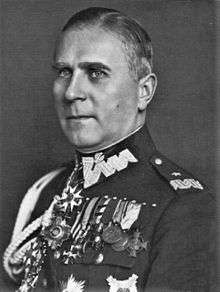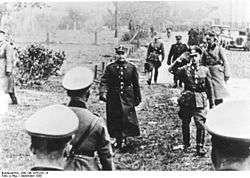Tadeusz Kutrzeba
| Major General Tadeusz Kutrzeba | |
|---|---|
 | |
| Born |
15 April 1885 Kraków, Galicia, Austria-Hungary |
| Died |
8 January 1947 (aged 61) London |
| Allegiance |
|
| Service/branch |
|
| Rank | General (Divisional General) |
| Battles/wars | |
Tadeusz Kutrzeba (15 April 1885 – 8 January 1947) was a general of the army during the Second Polish Republic. He served as a major general in the Polish Army in overall command of Army Poznań during the 1939 German Invasion of Poland.[1]
Biography
Tadeusz Kutrzeba was born in Kraków, a part of Austria-Hungary, since the 1795 partition of Poland. His father was a captain in the Imperial Austrian Army. In 1896, he was admitted to a military school for children in Fischau near Wiener Neustadt. He then continued his studies in the city of Hranice. Kutrzeba completed his secondary education in 1903. He graduated with distinction from the Military Technical Academy in Mödling and was commissioned as a second lieutenant, in an explosives ordnance unit. On account of his performance in school, he was given the option of choosing the location of his first posting. He chose to return to his native Kraków where he was posted from 1906 to 1910. In 1910, Kutrzeba continued his military education in Vienna, studying engineering, and was promoted to the rank of lieutenant in 1911. From 1913 to 1914, he was posted to Sarajevo, where he witnessed the immediate catalyst for the outbreak of the First World War: the assassination of Archduke Ferdinand.
World War I
At the outset of World War I, Kutrzeba commanded military forces in this Austro-Hungarian stronghold of Sarajevo. Later, he was sent to the Serbian front as a staff officer in the 2nd Mountain Artillery Brigade commanded by major general Ferdinand Komm. On 15 March 1915 he was sent to the Russian front as a communications officer for the German 24th Reserve Corps, which was engaged in the Carpathian region. During the middle of the war, he was promoted to the rank of captain. In June 1915, he was moved to the Italian front, where, among other posts, he was the inspector general of military fortifications in the Tyrol region. In July 1916, he was appointed as the chief of staff of military engineers in the Archduke Eugene’s army group. In this capacity, he gained many valuable experiences, not only by virtue of his assignment, but also due to his contributions in counter-attack tactics in difficult mountain terrain. On 1 August 1916 he was deployed to Transylvania, where he was appointed the inspector general of Austro-Hungarian fortifications in the region. A month later, he was appointed a communications officer for the German 9th Army’s general staff. In April 1917, Kutrzeba returned to the Russian front as part of the German-led Austro-Hungarian 4th Army, finding himself in Volhynia. As the army group was charged with protecting the Danube delta by the Black Sea, Kutrzeba used every opportunity to acquaint himself with practical military matters and coastal defense. In March 1918 he was appointed as the chief of staff of Austro-Hungarian forces at a military base near the city of Brăila.
World War II
During the invasion of Poland in 1939, General Kutrzeba commanded the Poznań Army, composed of four infantry divisions (14, 17, 25, 26) and two cavalry brigades (Wielkopolska and Podolska). He devised the Polish counterattack plan of the battle of Bzura and commanded the Poznań and Pomorze Armies during the battle. In the aftermath, he fought his way to Warsaw and arrived in the capital on September 22, where he briefly became the deputy commander of the Warsaw Army. At the behest of major general Juliusz Rómmel (commander of the Warsaw Army), he began capitulation negotiations with the German 8th Army. On September 28, he signed the official surrender documents.
After the siege of Warsaw, he was captured by the Germans and spent the rest of the war in several prisoner of war camps: Hohenstein, Königstein and Oflag VII-A Murnau. General Kutrzeba remained a prisoner of war until April 1945, when Oflag VII-A Murnau was liberated by American forces.


In April 1945 he was called to London, where he was offered the position of Minister of Defense in the Government-in-Exile, which he declined. Instead, he chose to head a historical commission that focused on the Polish Army’s military campaign in September 1939 and the contributions of Polish soldiers fighting in the West from 1939 to 1945.
Military Promotions (Second Polish Republic)
- Major (1919)
- Lieutenant Colonel (1920)
- Colonel (1922)
- Brigadier General (1927)
- Major General (1939)
Death
General Kutrzeba was given an opportunity to return to Poland. Due to poor health, however, he was unable to travel. General Kutrzeba died in London on 8 January 1947. Reportedly, the cause of his death was cancer.
Honours and Awards
Poland
- Commander's Cross of the Virtuti Militari, previously awarded the Knight's Cross and the Silver Cross (1921)
- Commander's Cross of the Order of Polonia Restituta (1930), previously awarded the Officer's Cross
- Cross of Valour - three times
- Gold Cross of Merit
Other
- Officer of the Legion of Honour (France)
- Commander's Cross of the Order of the Star of Romania
- Commander's Cross of the Order of the Crown (Belgium)
- Cross of Liberty, Class II (Estonia)
- Order of the Cross of the Eagle, Class II (1932, Estonia)
- Order of Lāčplēsis Third Class (Latvia)
- Academic Golden Laurel of the Polish Academy of Literature
References
| Wikimedia Commons has media related to Tadeusz Kutrzeba. |